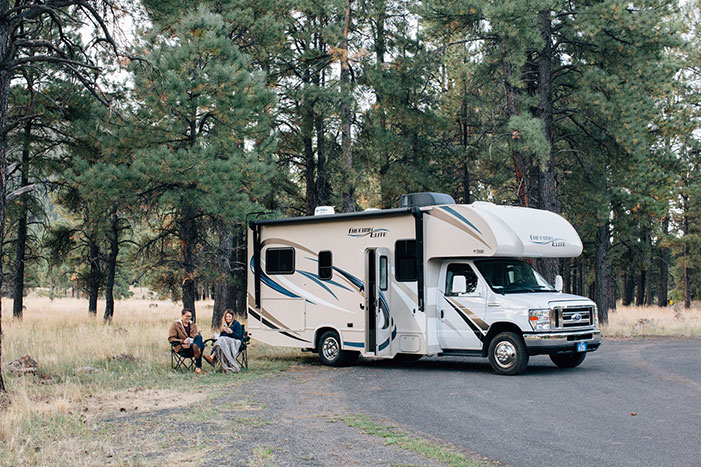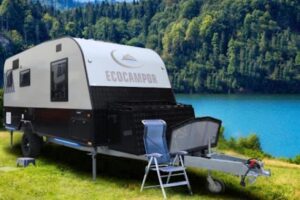So how does one keep the lights on when camping in an area without access to shore power?
This is a pretty frequent occurrence in the RV world. Many boondockers consistently drive deep into the backcountry to camp and rarely have access to shore power when they are anywhere but home. Even RVers who only stay at RV parks can end up overnighting at a park without hook-ups and needing a backup source of power to keep their rig running.
Enter the RV generator. RV generators exist for the sole purpose of providing electricity to a motorhome or travel trailer without a shore power connection. It doesn’t matter if you are 50 miles in the backwoods or 50 feet from your back door, with an RV generator you can supply your rig with hours of energy without ever connecting to the grid.
Important note: Technically solar panels and wind turbines are considered simple generators. Colloquially the word “generator” is most often used to refer to an electric generator that produces electrical energy from a liquid fuel source. This is how I will use the word “generator” in this article.
Electric Generators
All generators, whether they are being used in an RV, for commercial power supply, or in a residential application, convert chemical energy into electrical energy for storage or use in an external circuit.

How Do They Work?
This energetic conversion is done via a combustion engine and a chemical fuel source. A generator houses an internal combustion engine that works in conjunction with an alternator to convert the chemical energy contained within fuel into electrical energy.
When fuel is ignited within the combustion engine, it combusts and creates mechanical energy in the form of rotation. The alternator coupled to the combustion engine uses this rotation, and converts the mechanical energy into electrical energy.
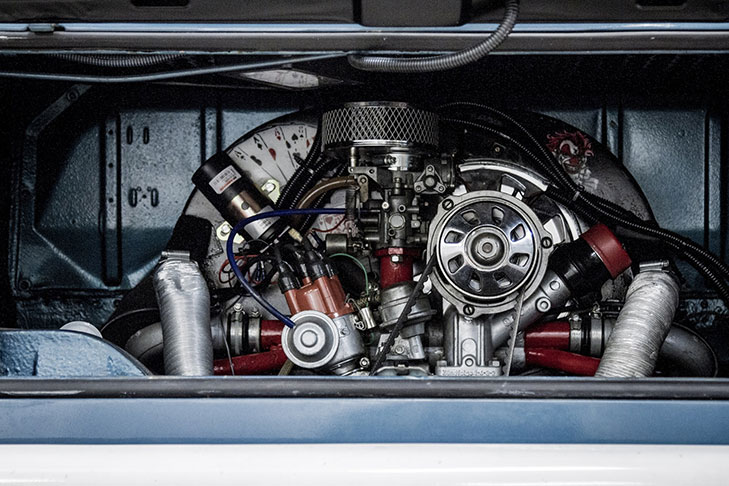
It’s very important to note that a generator does not create any energy. This is a common misconception about generators. The energy already exists in liquid, chemical form. Generators simply convert pre-existing energy into a form that humans can manipulate, store, and use to our advantage.
RV Generators
An RV generator is essentially just a generator that is specifically used for the purpose of providing electrical energy to a recreational vehicle. Regardless of the original intent of a generator’s manufacturer, if it is used to power a motorhome or travel trailer, it can be called an RV generator.
How Do RV Generators Work?
RV generators work no differently than any other generator. The process of converting chemical energy into electrical energy remains the same. The only difference between an RV generator and any other type of generator would be in how fuel is supplied to the generator and how off-gases are dealt with. I’ll dive a bit deeper into those details further along in the article.
Portable vs Built-in Generator
Stroll through any hook-up free RV park or popular boondocking location, and you’ll see two types of RV generators in use. Most motorhomes and some large travel trailers have built-in generators, while the majority of travel trailers, smaller campers, and slide-in truck bed campers run using portable generators.
Built-in generators are exactly what their name implies: built-in. These generators get installed directly into a specialized, vented compartment in an RV and are typically wired into the camper’s electrical system. In addition to being wired into the electrical system, built-in generators in motorhomes are commonly hooked up to the motorhome’s fuel reserves. This allows the generator to draw fuel directly from the fuel tank, eliminating the need for manually refueling. Built-in generators have a power output range of 2,500-12,500 watts.
A portable generator on the other hand, is not built into an RV. Portable generators are bought and utilized as a separate piece of RV gear or equipment. Due to their satellite positioning in relation to a camper, it is easy to ventilate off-gases produced by a portable generator. It can also be easy to reduce noise interference coming from a portable generator by setting it up far away from a camper. Just make sure to have long extension cords available and that RV neighbors won’t be bothered by the generator. Portable generators have a power output range of 1000-10,000 watts.

Pros and Cons for Built-in RV Generators
Built-in RV generators provide high output power and work very cohesively with other RV systems. They require little manual labor in their start up and operation which appeals to RVers who are differently-abled or prefer automated systems. Having a built-in RV generator that is already hooked up to the camper’s fuel system eliminates the need to carry around large surplus fuel reserves. Additionally, when a generator uses the same type of fuel as the RV, the RV owner does not need to source, purchase, or store multiple types of fuel.
The most significant drawback to having a built-in generator presents itself during maintenance and repairs. A built-in generator is more difficult to access than their portable counterparts. This can result in frustrating repairs for DIYers, and slightly more expensive repairs for those who rely on RV technicians for maintenance.
Pros and Cons for Portable Generators
A portable generator used for an RV can be a very versatile piece of equipment. Some RVers love being able to repurpose their portable generator for tasks other than providing power while camping. When you buy a portable generator for your RV, you buy a generator for all aspects of your life.
A significant disadvantage to using a portable generator for powering an RV is their power output. In some circumstances, portable generators do not have a large enough power output to power all of the equipment and appliances housed within a motorhome. This most commonly occurs when a motorhome has multiple air conditioners, a fridge, and kitchen appliances running at the same time. Portable generators also require manual setup, including loading and unloading from the rig, fueling, and running extension cords between the generator and camper.
Fuel Types for Generators
The most common sources of liquid fuel for RV generators are gasoline, diesel, and liquid propane (note that in the propane world, “propane” and “liquid propane” are used interchangeably to refer to the same thing). All three of these fuel sources act as a chemical energy source for the generator to convert to electrical energy.
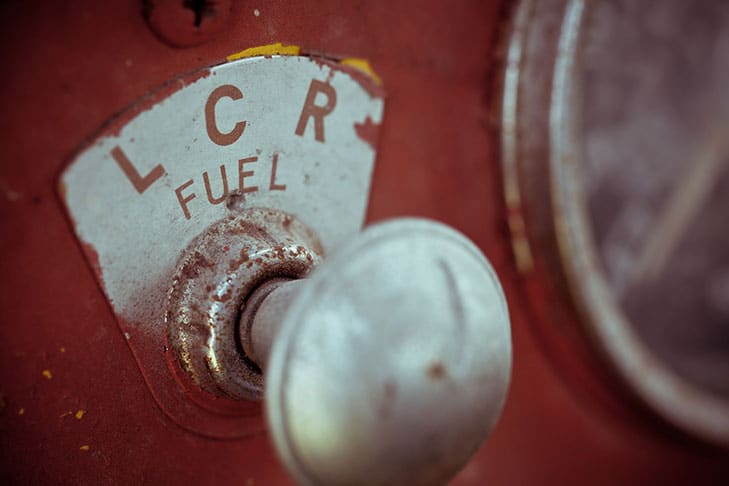
Gasoline Generators
Most small, portable generators seen around RV parks and at events are gasoline generators. They are relatively small, lightweight, and cheap, making them a fantastic first generator for new RVers. Gasoline burns in a way that produces a less potent and off-putting smell than diesel-powered models.
Gas-powered generators are popular amongst event workers who live and travel in travel trailers. Using a gas generator can allow them to rely on one type of fuel to power their trailer generator, tow vehicle, and various other pieces of equipment that they use for work.
Diesel Generators
Diesel generators are commonly used by folks who also have a diesel-powered tow vehicle or motorhome. As with all engines that run off diesel, these generators have a longer lifespan than their gas-powered counterparts. They consume noticeably less fuel than gas and liquid propane models and diesel fuel is almost always the cheapest fuel option. Keep in mind that diesel can have a smelly burn that is unpleasant to some folks.
It is uncommon to see portable diesel-powered generators being used as RV generators. Most diesel RV generators are built-in. Diesel generators have a higher purchase price than gasoline or liquid propane models.
Liquid Propane Generators
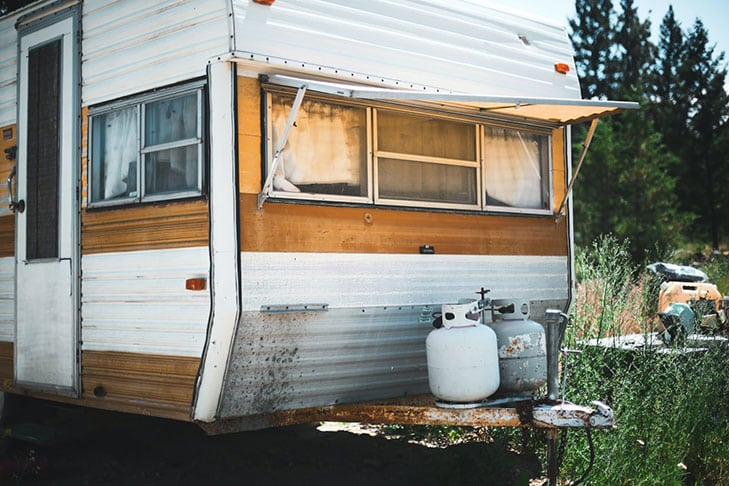
Liquid propane generators are powered by the same type of propane that is used for other systems in an RV, like cooktops and water heaters. Similar to gasoline generators, they are relatively cheap and lightweight. Built-in propane generators are hooked directly to the propane lines that run throughout the body of a camper.
Propane burns more efficiently than either gasoline or diesel, but the overall power output of a propane generator is around 10% less than that of petroleum fuel powered generators.
How Long Will an RV Generator Run?
This is a tricky question to answer as many people have drastically different opinions on this matter.
A generator will run for as long as it has fuel and air intake. Combustion engines require liquid fuel and oxygen to achieve the chemical reaction necessary to turn the motor and produce electricity. Theoretically, as long as a generator has a supply of these two things, it will continue to run until they run out. In reality, it’s a safe practice to give your generator a break every once and a while to cool down.
If you do not know how long you can run your generator continuously, read the user manual for guidance. If the user manual yields no answers, don’t hesitate to contact the manufacturer for information and assistance. Generators are powerful machines filled with flammable liquid. Never assume you can run a generator indefinitely.
A generator also needs regular maintenance. Some require maintenance every 500 hours of use, some 1000 or 1,500 hours. Make sure to stay on top of generator maintenance to ensure it’s always there to provide you power.
Inverter Generators
Inverter generators produce high-quality, consistent alternating current (AC) power for use in an RV.
Traditional generators use a combustion engine and alternator to produce a steady stream of AC power that is ready for use. When the load on the power supply increases or the motor speed changes, the quality of this AC power can decrease. Inverter generators use a system of clever electronics to prevent this decrease in power quality.
Using a built-in power inverter, the AC power produced by the alternator is converted into direct current (DC) power, and then back into AC power. At the end of this process, the AC power has the same purity and quality as AC power that is supplied to houses and buildings from power-grids. This “clean” AC power flows more consistently and is safer for sensitive electronics to use. This process also ensures that the AC output is independent of fluctuations in engine speed.
Frequently Asked Questions
Is it ok to run an RV generator all night?
With proper safety precautions like ventilation and carbon monoxide detectors in place, yes it is ok to run an RV generator all night. I wouldn’t suggest doing this if you have any RV neighbors within earshot as it’s poor RV etiquette to run generators through the night.
How long can an RV run on a generator?
An RV can run on a generator indefinitely. As long as there is enough fuel to keep the generator running, your RV will be able to keep up.
Does an RV generator run off an RV’s house battery?
Nope! All of the generators discussed in this article run from liquid fuel sources.
Generators are a critical piece of equipment in RV life. If you are in the market for one, do plenty of research and spend time giving serious thought to your power needs while you travel and adventure in your camper. Some hardware stores have strict no-refund policies in place to prevent people from “renting” a generator for the weekend. It would be pretty unfortunate to buy a non-refundable generator only to realize later down the line that it doesn’t meet your power needs.
Happy camping!

